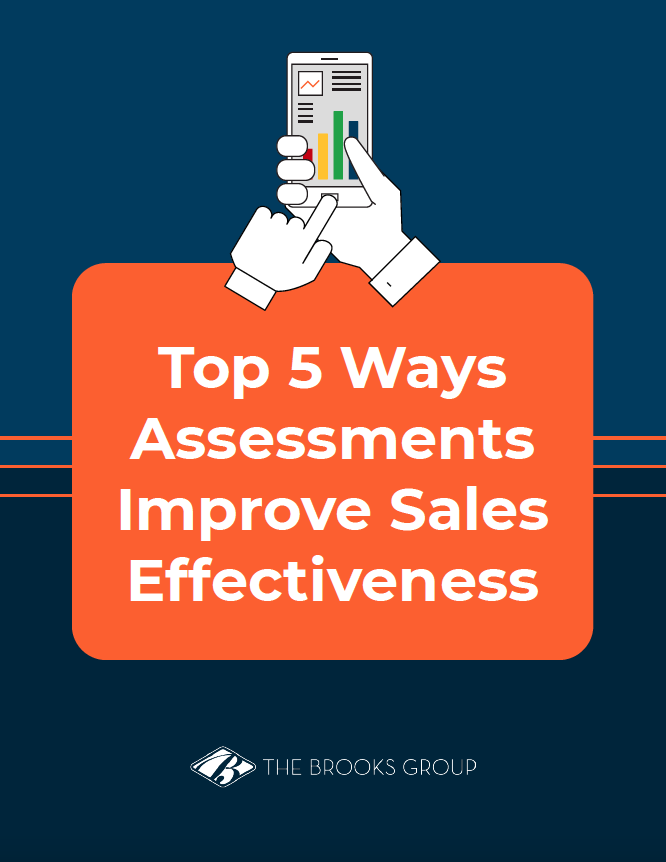Sales and emotional intelligence go together like skiing and snow. You can’t do the first well if you don’t have the second. Since the 1960s, emotional intelligence has been recognized as a critical component of both personal and professional success. Yet many sales leaders focus on building their team’s hard skills and neglect sales emotional intelligence or “soft skills.”
But developing emotional intelligence in sales matters. How sales professionals understand their emotions—and the emotions of others—can have a significant impact on sales performance. Learn what EQ is, why it matters, and how to tell if a new hire has it.
What Is Emotional Intelligence?
Emotional intelligence is the ability to be aware of one’s own emotions and the emotions of others and to manage them in a productive and empathetic manner. Emotional quotient is the level of a person’s emotional intelligence as represented by a score in a standardized test.
Daniel Goleman, the science journalist who introduced the concept of emotional intelligence in the 1960s, divided it into five categories. These five capabilities are the building blocks of a healthy, productive approach to life and work.
- Self-awareness
- Self-regulation
- Social skills
- Empathy
- Motivation
Importance of Emotional Intelligence in Sales
Highly emotionally intelligent sales professionals perform better at consultative selling than their less emotionally intelligent peers. To understand why that is, let’s take a look at how the five types of emotional intelligence affect sales performance.
1. Self-Awareness
Self-awareness is the ability to identify and understand your emotions and the impact they may have on your actions and on other people. Self-aware sales professionals are better able to manage their time and energy around their emotional states.
They’re less likely to anger or annoy a potential customer with their own negative emotions. And they bounce back from disappointment and rejection faster than sellers who ignore or are unaware of their negative feelings.
2. Self-Regulation
Self-regulation, also referred to as “impulse control,” is the ability to handle and adapt your emotions to fit the situation or to avoid disrupting others.
Self-regulated salespeople are able to avoid bringing their negative emotions—such as fear, anxiety, or irritation—to sales conversations. They’re better able to adapt their behavior to the needs of their job. And they’re capable of generating enthusiasm and motivation over the long term to fuel their job performance.
3. Social Skills
Social skills are the ability to be socially aware, make meaningful connections, build rapport, and maintain relationships over an extended period of time.
Sales professionals with strong social skills will be successful at prospecting because they’re able to maintain a larger, stronger network from which to draw sales opportunities. They’re also good at collaborating and cooperating with their peers. And they know how to “read a room” and adjust their own behavior to get the outcomes they desire.
4. Empathy
Empathy is the counterpoint to self-awareness. It’s the ability to identify and understand other people’s emotions—and the desire to respond to them productively. Empathetic sales professionals are good at judging how the customer or prospect is feeling.
They can adapt their approach and steer conversations in the right direction. Empathy also helps sellers visualize the customer experience to understand their needs, goals, and pain points so they can address them in the most effective way.
For sales professionals to be most effective, their empathy levels shouldn’t be too low or too high. After assessing thousands of salespeople, we’ve found that too much empathy can cause sellers to be overly sensitive to the feelings of others, resulting in avoidance during the sales process.
For example, they may avoid asking who else is involved in the decision-making process, inquiring about budget, or asking for the business because they feel the other person may find it rude, pushy, or confrontational.
5. Motivation
Motivation is the internally generated desire to complete a task or accomplish a goal. Sales professionals with strong motivation get more done in a day. They respond better to rejection and they seek out training and opportunities to improve their skills.
They embrace new behaviors and activities that help them reach their goals. They listen to coaching and apply it to their work. And they pursue promising leads and follow up on opportunities more assertively than their peers.
How to Hire an Emotionally Intelligent Candidate
Emotionally intelligent candidates will demonstrate self-awareness and an ability to empathize, inspire trust, regulate emotions, and connect effectively. When hiring a new individual for your team, look for specific examples and dig into how they navigate interpersonal situations.
Emotionally intelligent sales professionals are:
- Aware of their own strengths and weaknesses
- Resilient and able to bounce back from setbacks and losses
- Capable of establishing and maintaining strong internal and external connections
- Assertive in obtaining what they need to do their work
- Eager to learn and apply new skills to improve their performance
- Capable of generating their own internal motivation
- Skilled at recognizing others’ behavior styles and adapting their own to match
Here are some sample questions and things to look for when assessing emotional intelligence in potential sales candidates:
- Tell me about a time when you had to deal with a difficult or angry customer. How did you handle the situation? (Look for self-awareness, empathy, ability to regulate emotions.)
- Describe a situation where you had to motivate a demoralized team member or colleague. What was your approach? (Look for social skills, ability to inspire others, reading social cues.)
- How do you typically deal with stressful situations or deadlines? Give me a specific example. (Look for self-management, ability to stay calm under pressure.)
- Tell me about a time when you had to have a tough conversation with someone on your team about their performance. How did you approach it? (Look for empathy, communication skills, conflict resolution.)
- What experience do you have working with people from diverse backgrounds or cultures? How do you build rapport? (Look for adaptability, self-awareness of biases, respect for others.)
Sales EQ abilities to look for:
- Self-Awareness: Do they seem introspective and able to recognize their own emotions and tendencies?
- Empathy: Can they see things from the customer’s perspective? Do they actively listen?
- Emotional Regulation: How do they describe handling stressful or challenging situations? Do they seem level-headed?
- Motivational Skills: Can they describe ways to keep themselves or colleagues engaged and energized?
- Social Skills: Do they make eye contact? Do they pick up on social/non-verbal cues?
Developing Emotional Intelligence on Your Sales Team
Emotional intelligence is a set of soft skills that can be developed to improve your sales team’s performance. Your team will be more equipped to use a value-based selling approach that requires understanding prospects and communicating value.
You can help your sales professionals increase their emotional intelligence and perform to their maximum potential with a sales assessment.
A comprehensive EQ assessment will allow your team members to gain self-awareness and make better decisions. Assessments reveal strengths and gaps relating to emotional intelligence and offer insight into improving low competency areas.
Often, sales professionals are derailed or distracted by their emotions in the sales process, which can lead to them leaving opportunities on the table. They may present off-target solutions, not ask the right questions or enough questions, or fail to position themselves as a trusted advisor rather than a nuisance.
Having a high level of emotional intelligence allows sales professionals to sense, understand, and effectively apply the power of their own emotions during interactions with buyers to improve sales rather than derail them.
Learn More
Help your sellers perform to their maximum potential with the EQ (Emotional Quotient) Assessment.
White Paper Download
Top 5 Ways Assessments Improve Sales Effectiveness
Assessments are a powerful tool sales leaders can use to understand to hire smarter, coach effectively, retain top performers and ultimately improve sales effectiveness and performance.
This guide outlines the top 5 ways you can use assessments to improve sales effectiveness.





